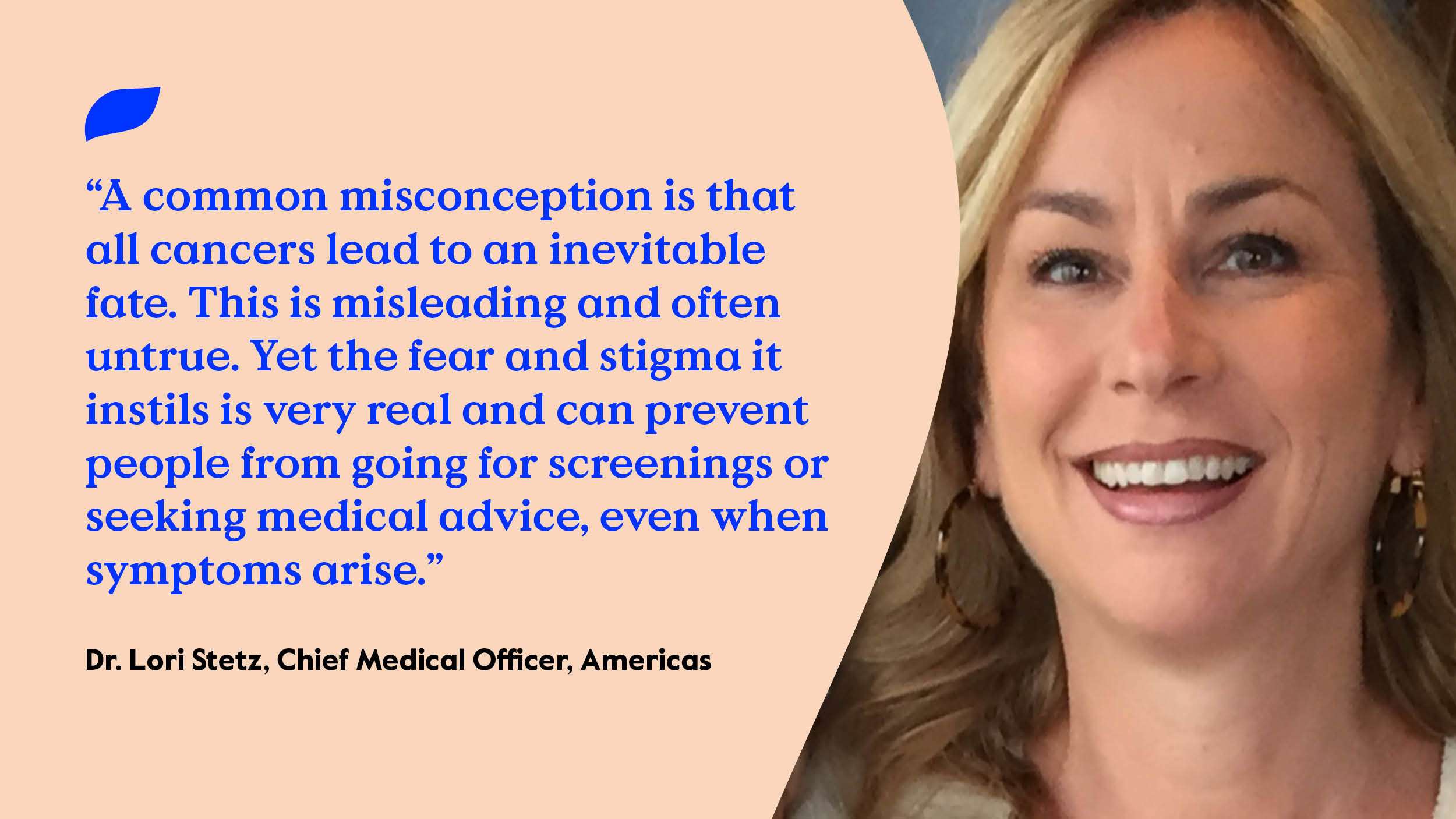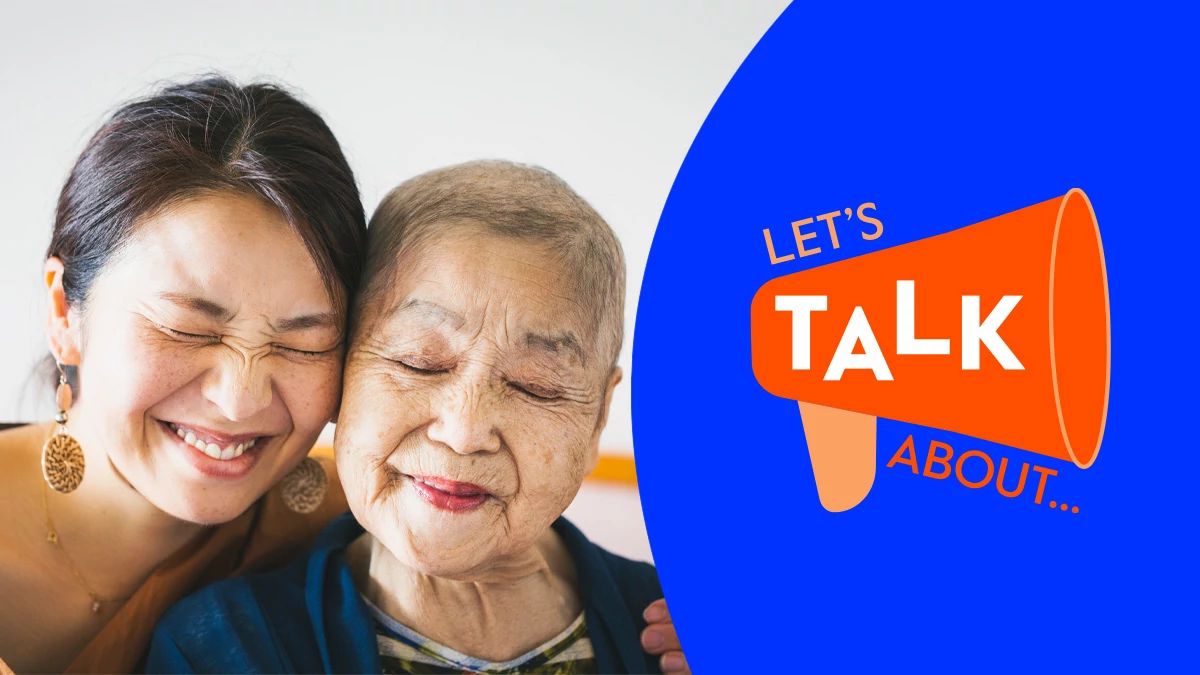- For SME and Groups
- For Individuals
Group Health Insurance
About Cigna Healthcare
Let's Talk About Cancer Awareness and Prevention
Continuing our Let’s Talk About health series, this article tackles cancer; one of the world’s most feared health problems. We now have access to knowledge, treatment, and therapies that can not only save lives but prevent certain types of cancer altogether, yet cancer continues to be the second leading cause of death globally. Why is this?
Dr Lori Stetz, Chief Medical Officer - Americas, International Health, Cigna Healthcare and a member of the scientific advisory board for TargetCancer Foundation, an organisation in America dedicated to fundraising for rare cancer research, shares her insights on cancer awareness and reveals some fundamental but perhaps surprising truths about cancer. Let’s talk about it.
Cancer’s devastating impact is hard to ignore. It has been estimated that the number of cancer cases will increase from 19 million per year in 2020 to close to 29 million by 2040. Cancer is the leading cause of death in Singapore, with almost 1 in 3 deaths [PDF] attributable to cancer. It is unfortunately likely that you or someone close to you will be directly affected by cancer at some point in your life.
For much of history, cancer was considered an ageing-related illness – and with good reason. Nearly 60% of new cancers are diagnosed in individuals aged 65 or above, and now that we are living longer, cancer has become more prevalent.
But more and more young people are also getting cancer and worryingly, cancers that impact the younger, working-age population are often more aggressive, with higher mortality rates.
Early prevention and treatment are therefore key. Luckily, we now have a myriad of tools, treatments, and therapeutics to prevent, detect, and treat cancer. For the sake of future generations’ prosperity and health, it is critical that we raise awareness of life-saving medical innovations and dispel misconceptions that prevent cancer screenings, diagnostics, or well-being programs.
While cancer is now widely discussed, there is clearly room for improvement in how we communicate about it. Through this Let’s Talk About article, we aim to pinpoint some of the biggest roadblocks to effective cancer care and prevention and outline why we need to encourage more open conversation.
Cancer prevention – routine tests, checkups and vaccination
Perhaps the most positive news is that over 40% of cancers are now preventable just by living a healthy lifestyle; – maintaining a healthy weight, being physically active, and limiting or abstaining from alcohol or smoking.
Following cancer screening guidelines is also important, as that can help prevent late-stage diagnosis. Indeed, some routine tests, such as colonoscopies and various gynecological exams, including the Human Papillomavirus (HPV) test, papanicolaou (pap) test, and visual inspection with acetic acid, can help prevent cancer by identifying precancerous cells at an early stage so that they can be removed.
But it is not always that straightforward. Breast cancer, for example, is the fourth leading cause of cancer-related deaths, and mammography screening is the only test shown to reduce breast cancer deaths. Yet, apprehension has been widely acknowledged as a reason why many women avoid this potentially life-saving medical procedure. Similarly, people frequently avoid screening for colorectal cancer screening (the second most common cause of cancer-related deaths) possibly due to fear or embarrassment.
It is clear that these psychological barriers need to be reduced in order to encourage attendance for routine screening, and the same may apply to another critical cancer prevention tool: vaccines.
Finding a vaccine is the “holy grail” for any disease area, and highly effective vaccines have emerged for certain types of cancer. A good example is the HPV vaccine, which not only protects against genital warts, but also most cases of cervical cancer (with close to 100% efficacy), as well as cancer of the vagina, vulva, penis, anus, mouth, throat, head, and neck caused by HPV.

The use of the HPV vaccine for females and males aged 9 to 45 is approved for use by the Health Sciences Authority. Because of its efficacy in preventing cervical cancer, it is a nationally recommended vaccination for females aged 9 to 26. To encourage the uptake of the vaccine, the HPV2 vaccination is made available for all Secondary 1 and 2 female students in school; and the vaccination is also fully subsidised at CHAS GP clinics and polyclinics. However, as HPV is predominantly a sexually-transmitted disease, some parents could be reluctant to give permission for their children to receive the vaccine.
More education is needed about cancer. As a society, we must be rational about healthcare decisions which can have a life-long, life-saving impact.
Living with cancer
A common misconception is that all cancers lead to an inevitable fate. This is misleading and often untrue, and many are now able to live with and overcome cancer. Yet the fear and stigma it instils is very real and can prevent people from going for screenings or seeking treatment, even when symptoms arise.
While certain cancers – such as pancreatic, lung, or stomach cancer – are still associated with relatively high mortality rates, many cancers have incredibly high survival rates, with thyroid cancer topping the charts at 98% survival.
Furthermore, newly developed targeted therapies involving monoclonal antibodies or small molecule inhibitors, and immunotherapies have been found, in some instances, to be more effective than traditional chemotherapy and can have a much less severe impact on the patient’s quality of life.
For many people, a cancer diagnosis is a life-changing and emotionally difficult time. The mental health impact often follows the patient throughout their cancer journey and even beyond, with one meta-analysis revealing that childhood, adolescent, and young adult cancer survivors were 57% more likely to develop depression, 29% more likely to develop anxiety, and 56% more likely to develop psychotic disorders in the years following treatment.
Beyond the impact on their physical and mental health, cancer can also put a significant financial strain on patients and their family (even with government subsidies and support), which may be exacerbated by cancer-related disabilities that impact the individual’s ability to work even after recovery.
Workplace support for cancer – employer duty of care
Our perception of cancer needs to keep pace with the leaps and bounds being made in cancer therapies and innovations. The key to cancer prevention and long-term survival is early detection and treatment. This can help patients to live with cancer and manage it like any other chronic disease (such as diabetes).
With cancer incidence increasing in the younger population – many of whom are working adults – there is an increasingly pressing role for employers in cancer awareness and support.
We are seeing companies investing more in employee health and well-being. This may be through insurance coverage, disease awareness events, or even on-site health screening services – all of which can help alleviate the high cost of cancer treatment and other health services.

Earlier on, we talked about fear and stigma deterring some people from seeking appropriate cancer services, but for employees who are globally mobile, or frequently work away from home, it might be as simple as forgetting to get regular checks. Even for employees working hybrid or remote roles, it can be hard to keep health appointments. For these professionals, cancer-related HR and internal communications should be enhanced, helping to inform globally mobile employees of their healthcare benefits, remind them of the importance of regular health screenings, as well as to provide any necessary information and support.
It is critically important for employers to understand their duty of care. Today, many people continue to work even after being diagnosed with cancer, and in many countries and jurisdictions employers are legally obliged to make reasonable accommodation for workers who need cancer care.
Successfully fulfilling our duty of care also comes with significant rewards, such as a positive corporate culture, increased engagement and productivity, talent retention and acquisition, and enhanced health and safety. Conversely, failing to do so brings significant legal and reputational risks.
The cost of cancer
Cancer is expected to cost the world $25.2 trillion in international dollars between 2020 and 2050, accounting for healthcare costs, lost labor, and spent savings. As Simiao Chen, the lead author of this study, explains, "Addressing cancer is expensive. But the cost of not addressing cancer is even higher."
We urgently need to examine our understanding of cancer and how we talk about it. We must recognise that cancer is treatable –in some cases preventable – and we all have a role to play to use the tools we have and to keep advancing.
Despite the impact and challenges, both physical and psychological – with the right treatment we can often live a fulfilling life with cancer.
Get a Quote Today
Let our consultants prepare and arrange a customised group health insurance plan that best meets your needs.
Contact Us
Popular Links
Resources
Connect with us
© 2024 Cigna Healthcare. All rights reserved.
Cigna Europe Insurance Company S.A.-N.V. Singapore Branch (Registration Number: T10FC0145E), is a foreign branch of Cigna Europe Insurance Company S.A.-N.V., registered in Belgium with limited liability, with its registered office at 152 Beach Road, #33-05/06 The Gateway East, Singapore 189721.
The Cigna Healthcare name, logo, and other Cigna Healthcare marks are owned by The Cigna Group Intellectual Property, Inc. licensed for use by Cigna Corporation and its operating subsidiaries. All products and services are provided by or through such operating subsidiaries, and not by Cigna Corporation. Such operating subsidiaries include Cigna Europe Insurance Company S.A.-N.V. Singapore Branch.

